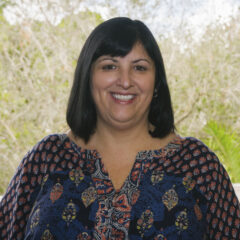Andrea Goldstein PsyD
Assistant Professor of Dialogues

Contact
| [email protected] | |
| Phone | +1 561-237-7499 |
| Department | College of Arts and Sciences |
| Location | Trinity Residence Hall |
WhyLynn
Lynn University offers an environment where everyone matters. The faculty, staff, and students all work together to create a family-like atmosphere where learning is embraced and cultivated through strong relationships. Everyone looks out for one another and helps one another to be successful in all aspects of the learning experience.
Professional profile
Andrea Goldstein joined Lynn University as an adjunct faculty member teaching Self and Society in the Dialogues as well as forensic case studies, physiological psychology, applied psychology, and human behavior. She began teaching at the college level in 2005. Her overall educational philosophy revolves around the notion that you should only teach if you have something valuable to offer to students.
Goldstein is a forensic psychologist that has worked in jails, prisons, family court, and maximum security forensic hospitals. She is a profiler and expert witness with a specialty in diagnostic assessment. She is also a jury consultant and mediator. She brings with her many years of expertise in the field.
Andrea Goldstein’s educational pursuits have focused on history, education, psychology, criminology, criminal justice, forensics, women’s studies, and counseling. She has written textbooks, articles, supplemental textbook materials, and presented faculty development for faculty around the country. Her first Master’s thesis was entitled “Birth Order and Intelligence.” Her second Master’s thesis was entitled “The Genetic Components of Schizophrenia.” Her doctoral dissertation was entitled “A Program Design to Treat Individuals Who Commit Crimes of Passion Due to Romantic Jealousy.”
Education
- B.A. Florida Atlantic University
- M.S. Nova Southeastern University
- M.S. Miami Institute of Psychology
- PsyD Miami Institute of Psychology
Teaching philosophy
Andrea Goldstein believes that student-focused learning promotes learning that is both purposeful and enduring. She feels that it is her responsibility to understand her students, the kind of knowledge and experience they bring to the classroom, and their ultimate goals. She embraces case based teaching and other active learning activities because they stimulate intellectual camaraderie, argumentation, and cooperative problem solving and lay the groundwork for life-long collaborative interaction. Educators who demonstrate curiosity and passion about a subject area motivate students to learn.
Teaching specialties
- Interdisciplinary studies
- Psychology
- Criminal justice
- Forensics